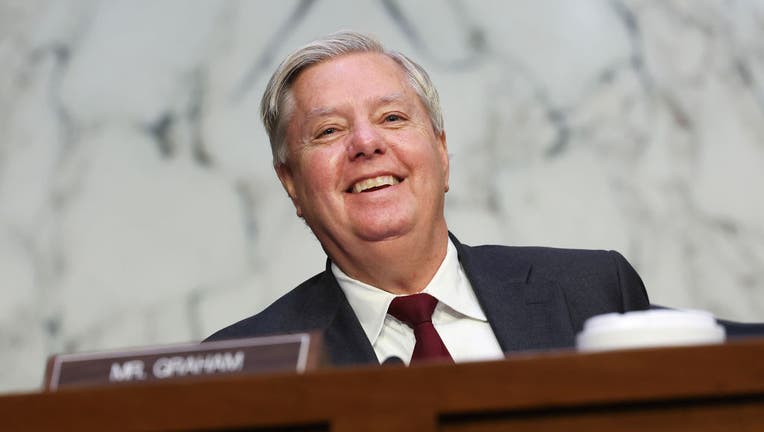Justice Clarence Thomas temporarily halts Graham's testimony in Fulton County grand jury investigation

U.S. Sen. Lindsey Graham questions Peiter "Mudge" Zatko, former head of security at Twitter, during a Senate Judiciary Committee on data security at Twitter. (Photo by Kevin Dietsch/Getty Images)
FULTON COUNTY, Ga. - Supreme Court Justice Clarence Thomas has temporally granted U.S. Sen. Lindsey Graham's request to bar him from testifying before the special Fulton County grand jury investigating whether then-President Donald Trump and others illegally tried to influence the 2020 election in the state.
In an order released Monday afternoon, Thomas, who handles emergency appeals from Georgia and other Southern states, unilaterally decided to stay a ruling by a lower court that declined to halt the senator's testimony.
Thomas' order temporarily prevents Graham from testifying pending further orders by Thomas or the entire Supreme Court.
Thomas' decision is the latest in Graham’s ongoing fight to prevent his testimony in a case that has ensnared allies and associates of the former president. Some have already made their appearances before the special grand jury, including former New York mayor and Trump attorney Rudy Giuliani — who’s been told he could face criminal charges in the probe — attorneys John Eastman and Kenneth Chesebro, and former White House counsel Pat Cipollone.
Graham, a four-term senator who last won reelection in 2020, was first subpoenaed in July by Fulton County District Attorney Fani Willis, who opened her investigation shortly after a recording of a January 2021 phone call between Trump and Georgia Secretary of State Brad Raffensperger was made public. In that call, Trump suggested Raffensperger could "find" the votes needed to overturn his narrow loss to Democrat Joe Biden.

Full call between Trump and Georgia’s secretary of state
FOX 5 Atlanta has obtained the full phone call between the Georgia Secretary of State's Office and President Donald Trump along with several key White House staff.
Willis wants to question Graham about two phone calls he made to Raffensperger and his staff in the weeks after the election.
During those calls, Graham asked about "reexamining certain absentee ballots cast in Georgia in order to explore the possibility of a more favorable outcome for former President Donald Trump," Willis wrote in a petition seeking to compel his testimony.
Graham also "made reference to allegations of widespread voter fraud in the November 2020 election in Georgia, consistent with public statements made by known affiliates of the Trump Campaign," she wrote. She said in a hearing last month that Graham may be able to provide insight into the extent of any coordinated efforts to influence the results.

Will Lindsey Graham testify for grand jury in Atlanta?
Sen. Lindsey Graham is legally fighting a subpoena to testify for the grand jury investigating allegations of election interference in 2020. He claims his statements to Sec. Brad Raffensperger are protected by the "speech and debate clause."
Raffensperger said he took Graham’s question about absentee ballots as a suggestion to toss out legally cast votes. Graham has dismissed that interpretation as "ridiculous." Graham has also argued that the call was protected because he was asking questions to inform his decisions on voting to certify the 2020 election and future legislation.
Graham challenged his subpoena in federal court, but a judge refused to toss it out. Graham then appealed to the 11th U.S. Circuit Court of Appeals, and a three-judge panel ruled Thursday in favor of Willis. Graham can appeal to the full court.
Graham’s lawyers argued that the Constitution’s speech or debate clause, which protects members of Congress from having to answer questions about legislative activity, shields him from having to testify.
Thomas’ wife, Virginia "Ginni" Thomas, is a conservative activist and staunch Trump supporter who attended the Jan. 6 "Stop the Steal" rally on the Ellipse and wrote to Meadows in the weeks following the election encouraging him to work to overturn Biden’s victory and keep Trump in office.
She also contacted lawmakers in Arizona and Wisconsin in the weeks after the election, though no evidence has emerged that she contacted Georgia officials. Thomas was recently interviewed by the House committee investigating the Jan. 6 insurrection, and she stood by the false claim that the 2020 election was fraudulent, despite the fact that numerous federal and local officials, a long list of courts, top former campaign staffers and even Trump’s own attorney general have all said there is no evidence of mass fraud.
The Associated Press contributed to this report.

